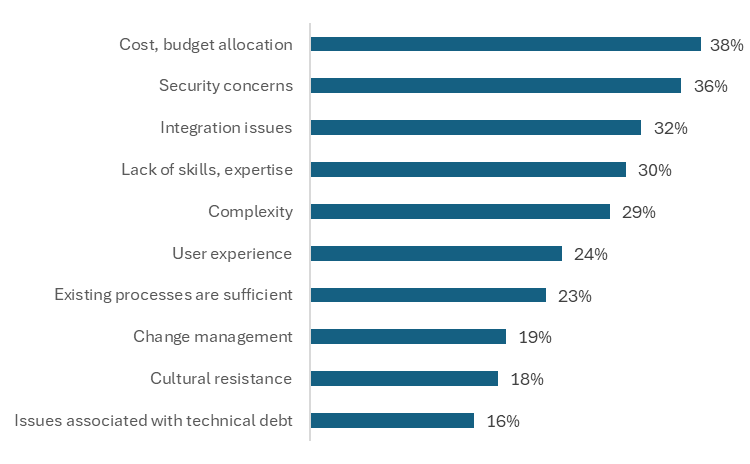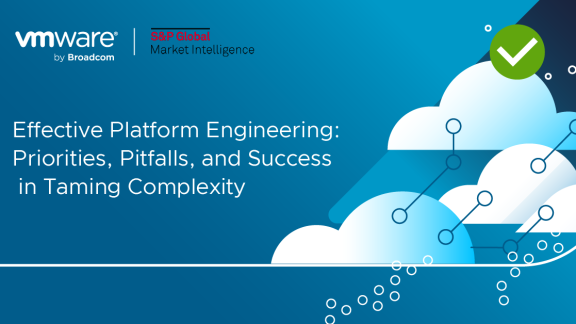Guest post by Jay Lyman, Senior Research Analyst, S&P Global Market Intelligence 451 Research
This blog is the second in our series, “Effective Platform Engineering: Priorities, Pitfalls and Success in Taming Complexity and Managing Today’s Enterprise Infrastructure and Applications.”(read the first blog here) and a companion to the analyst report, “Cost, Productivity, Security Shape Today’s Platform Engineering”
To implement effective platform engineering, enterprise teams must address significant challenges related to complexity and integration across infrastructures, applications, tools and teams. Key to overcoming these challenges are consolidated, consistent and simplified operations that enhance developer productivity, increase cost efficiency, and improve quality and security.
Tackling integration and complexity
IT teams commonly cite integration and complexity as hurdles to effective platform engineering and DevOps, as highlighted in our Voice of the Enterprise survey (see figure below).
Challenges in adopting platform engineering

Q. What challenges, if any, do you expect (or have you encountered) in adopting platform engineering? (Select top 3).
Base: Respondents whose organizations have platform engineering initiatives.
Source: 451 Research’s Voice of the Enterprise: Cloud Native, Platform Engineering 2024.
Simplified operations focused on unified lifecycle management can help reduce the complexity of modern enterprise infrastructure and applications, including rapidly evolving tools and platforms such as Kubernetes. While Kubernetes promises effective management of applications and infrastructure at massive scale, it can also introduce complexity due to its various open-source components for orchestration, monitoring, observability and security. These components require centralized and consistent support to enhance operational efficiency, collaboration, governance and control.
The platform approach
Enterprises can simplify operations by consolidating and ensuring consistency across compute, storage, networking and security resources through a unified platform that can integrate with other tools and platforms across software development and deployment processes. It is also important to enable self-service among developers, platform engineering and other teams to provide easy access to the necessary tools while minimizing friction and delays. This approach allows enterprises to implement effective governance and policies without hindering their development and IT operations. By relieving stakeholders from the burden of managing infrastructure and applications through streamlined operations, they can focus on developing new features, products and innovations.
Looking ahead
While DevOps has improved collaboration, process and culture, platform engineering promises to build and maintain platforms that streamline application development and deployment. When implemented effectively, platform engineering can deliver benefits such as improved developer productivity, faster delivery time, improved security and higher-quality code, as highlighted in our Voice of the Enterprise survey. Other advantages include cost and labor efficiencies, consistency and standardization, and enablement of on-demand, self-service usage, underscoring the importance of addressing key platform engineering challenges.
About the Author
Jay Lyman is a senior research analyst with the 451 Research Cloud Native and Applied Infrastructure & DevOps channels at S&P Global Market Intelligence. He covers software development, hybrid and multi-cloud infrastructure management and orchestration, and enterprise use cases that focus on the confluence of software development and IT operations known as DevOps. Jay’s analysis encompasses evolving software release and IT operations models, including generative AI’s role in both, and the technology used to create, deploy and support infrastructure and applications in today’s enterprise and service provider markets. This research includes data and analysis from the Voice of the Enterprise: DevOps survey of both IT decision-makers and practitioners. Other key areas of research include cloud native, open-source software and enterprise end users. Jay arrived at S&P Global Market Intelligence through its 2019 acquisition of 451 Research. Prior to 451 Research, Jay worked as a journalist for various media firms and publications including CMP Media, LinuxInsider, NewsForge, Time Magazine and the Associated Press. Jay has been a speaker at numerous industry events, including IC3, DevOps Days, LinuxCon and OSCON, covering topics such as cloud computing, DevOps, open-source software and enterprise case studies.

Discover more from VMware Cloud Foundation (VCF) Blog
Subscribe to get the latest posts sent to your email.





